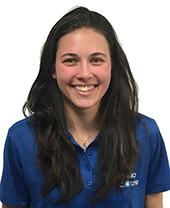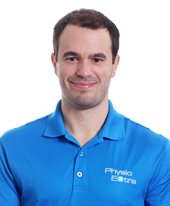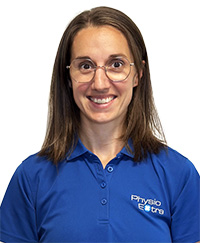Our functional capacity development program (FCDP), or second-line return-to-work program, is designed to help you regain your functional capacities (leisure activities, activities of daily living, and work) under the supervision of an interdisciplinary team of qualified professionals. FCDP participants are followed by a kinesiologist, an occupational therapist, and a physiotherapist. The team is trained to address issues related to physical health, mental health, and long COVID. When needed, psychoeducation or psychology services may also be provided.

What makes us different
One of the strengths of PhysioExtra’s FCDP is that the interdisciplinary team isn’t limited to the three professions listed above. The team members emphasize innovation, quality of care, and medical research to make sure our FCDP is always based on best practices and the latest scientific literature.
The program
The program begins with a functional capacity evaluation an assessment of rehabilitation potential at one of our six clinics. After that, the program usually runs from 3 to 6 hours a day, for up to 5 days a week (depending on your needs), over an average of 4 to 7 weeks. It includes a wide range of tools from general activation exercises to graduated work simulations, as well as mandatory workshops on topics related to persistent pain.
The program is open to all clients and is covered by most public and private insurers (some conditions apply).
LONG COVID
program
Faced with a growing need for services by clients with long COVID, Groupe PhysioExtra trained its professionals to offer an interdisciplinary functional rehabilitation program for this condition.

Did you know that according to the scientific literature:
- Between 10 and 46% of patients who still have symptoms after seven months had reduced their work hours, and 19 to 22% still had not returned to work;
- Between 30 and 50% of patients with COVID-19 will develop long COVID, based on current data;
- Long COVID patients can suffer from a combination of up to 200 different symptoms, affecting their health and quality of life;
- 62% of patients reported moderate-to-severe problems with their daily activities after 6 months;
- Most patients live with financial insecurity and dismissal of their condition by insurers, family members, and health professionals.
Designed for all patients, this new program is offered both in person and online. The treatment plan will be adjusted based on the patient’s symptoms, functional capacities, and goals. Because the spectrum of symptoms is broad, the first step is an initial assessment of the patient’s problems. The interdisciplinary team will then either schedule a series of one-on-one meetings with patients who have serious limitations, or enroll patients who are considering a return to work in a rehabilitation program.
For more information, contact our various rehabilitation services coordinators in the network
Montréal Region

Laurentian Region

Lanaudière Region

Montérégie Region

Région de l'Estrie


